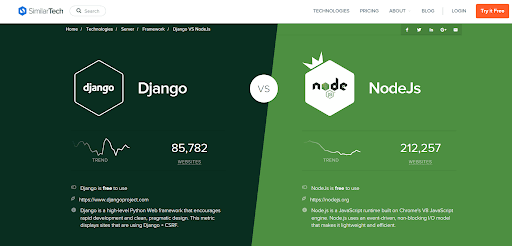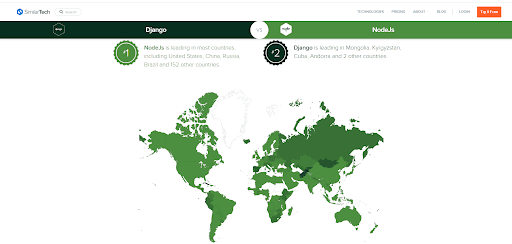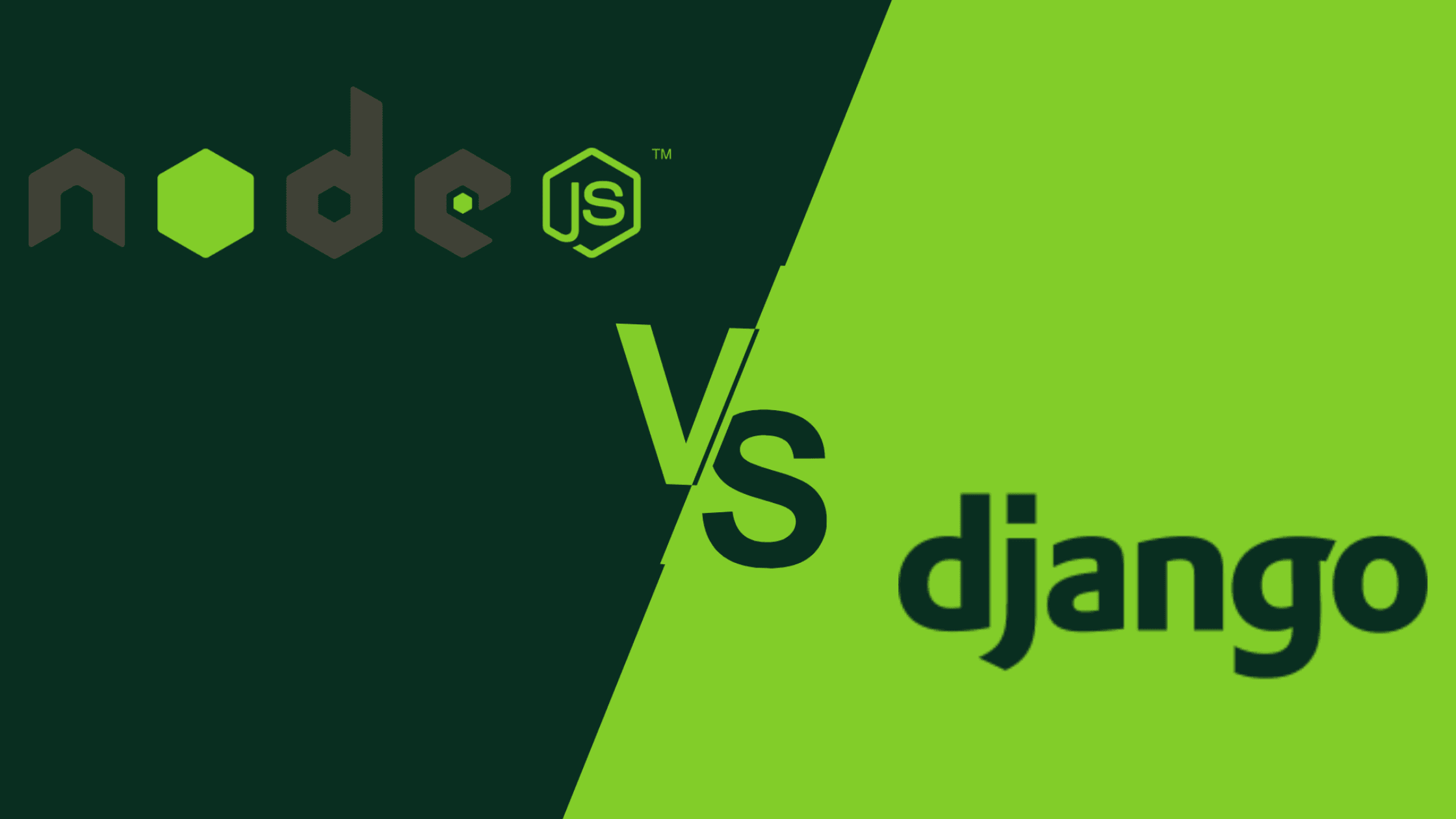While describing an ideal web application, we mostly appreciate what’s on the screen, from its interface to smooth navigation, designs, color palette, and the list goes on.
But, we often underestimate that all these are an outcome of adopting a high-performing web application framework.
The tech leaders are singing praises of Node.js and Django on how they are a perfect match for creating high-end applications that specialize in offering excellent user interfaces.
Both Node.js and Django are open-source frameworks where Node.js is developed on Javascript and Django is based out of Python.
Despite that, we cannot go with both of them, right?
One of these frameworks will suit your requirement better than the other, maybe because of its features, performance, learning curve, scalability, and many other factors that will help you choose the right decisions.
This article will go in-depth on various parameters that can influence selecting an optimum web application framework.
Node.js vs. Django: Overview
Before starting the comparison, you must know what these frameworks do and how they help in website building.
What is Node.Js?
Node.js is an open-source JavaScript-built runtime environment. Ryan Dahl released it in 2009, composed out of JavaScript, C, and C++. Plus, the framework is based on a non-blocking I/O model where the request thread is queued straight away for execution.
Being a JavaScript model, Node.js is capable of supporting both server and client-side. The framework can also be used for backend development as it uses only JavaScript for the entire application.
If you are comfortable with JavaScript, then Node.js would be relatively easier for you to learn.
Also, read: Node.js Tutorial for Beginners
What is Django?
Django was launched in 2005 by Adrian Holovaty and Simon Willison, Python web developers working in Lawrence Journal-World newspaper. This programming language is based on Python and can be used to build high-end web applications across platforms.
Unlike other programming languages, Django does not follow the standard Model-View-Control system. It has established a unique MVT concept of Model-View-Template where Django itself controls the communication made between Model and View. The Django Template Language (DTL) bridges the gap between CSS, HTML, and Python.
The popularity of Django is because of how fast it makes the entire development process by reducing repetitive actions and leveraging the existing code whenever required.
Also, read: Hire Dedicated Nodejs Developers for Your Project
Node.js vs Django: Popularity
Node.js is definitely more popular than Django.
In research posted by Similar Tech clearly indicates the continuous inclination towards Node.js than Django.
If we talk numbers, Node.js supports 21,257 websites on the internet, but Node.js is still at 85,782 websites.

Plus, the market of Node.js is larger than Django.

However, both programming languages do support some big brands.
Django is adopted by Instagram, Youtube, DropBox, Mozilla, Spotify, Pinterest, etc.
And, Node.js supports NASA, Uber, Trello, eBay, Payal, Medium, and other authoritative websites.
So, if you want to go with a programming language that is mostly preferred, then Node.js would be a go-to option.
Node.js vs. Django: Performance
The performance metric of any programming language depends on the speed of web development; the faster it is, the better.
If we compare the performance of Node.js and Django, both follow a unique framework to speed up the web development process.
Node.js follows a single thread I/O model where the requests aren’t blocked and are up for execution right away. Plus, using the Google V8 engine to process these requests makes the web development process quite faster.
In contrast, Django is based on multiple threads that make it helpful in building large applications. It follows a unique MVT framework that is dedicatedly made to promptly process the request. For developers, Django offers in-built libraries where they can download various code packages and use them instead of typing them again.
Considering all the points, Django does lead here with its processing multiple threads and MVT model.
Node.js vs. Django: Learning curve
Node.js is wholly based on JavaScript, so if you are someone who knows this programming language, then it won’t be much of a hassle. However, Plus, there are several resources available online to allow you to understand Node’s architecture and method.
On the other hand, Django is built on Python and has its unique MVT model. To develop a web application through Django, developers must learn a pre-defined work model, and all this combined with Python makes it a lot more challenging.
The learning curve of Django is more complex than Node.js.
Node.js vs. Django: Security
Every web application requires a robust security framework that helps safeguard against attacks like SQL injection, Cross-site Scripting (CSS), Cross-Site Forgery (CSF), and many others.
Node.js is definitely an excellent programming language, but it does not protect your website. Your developers have to make sure that the website is safe, as there is no default security setting in the platform.
However, Django is well-versed in providing optimum security features. The programming language closely monitors any malicious activity and sincerely handles SQL queries to block any SQL injection actions.
Django provides protection against Cross-site scripting (XSS) protection, Clickjacking protection, Cross-site request forgery (CSRF) protection, Host header validation, and SSL/HTTPS.
Node.js vs. Django: Scalability
The scalability of a platform can be measured either by adding the latest high-end features or building a platform that could handle humongous traffic or even both.
While developing web applications through Node.js, you can access microservice infrastructure that helps build independent, scalable platforms. Node.js can handle multiple requests simultaneously, and microservice creates small modules to accelerate scalability.
However, being a single-threaded programming language, which doesn’t perform well in CPU-intensive conditions.
In contrast, Django has the upper hand in building scalable platforms. The programming language runs on multiple threads and incorporates the MVT model with various tools necessary for developing bigger applications.
Node.js vs. Django: What to choose?
Node.js is best for smaller applications. It is based on single threads that follow an I/O non-blocking module, which means developers can process multiple requests simultaneously. You can also use Node.js if there are fewer CPU cycles and not building heavy algorithms.
Plus, if you are comfortable with Javascript, the programming language will be quite easy to understand.
Contrary, Django should be your go-to platform if you want to build an application with premium security features. The programming language is based on multiple threads, making the platform viable for adding extra features for the future.
Ultimately, your choice of programming language must depend on what type of web application you are trying to build. After analyzing all the features, pros, and cons of both these languages, you can definitely conclude what you should choose.
